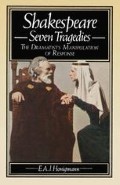Abstract
Why should Shakespeare re-write the tragedy of Brutus and call it The Tragedy of Hamlet, Prince of Denmark? The more we compare the two plays the more likely it seems that he felt dissatisfied with his first mature tragedy, and that he went over the same ground again because he recognised, too late, that he had not made the most of it. Advancing from Brutus to Hamlet he must have pondered many of the fundamental questions of tragedy — not least, I think, the tragic hero’s relations with the audience.
Preview
Unable to display preview. Download preview PDF.
Notes
See Coleridge’s Table Talk (1917 ed.) p. 65
and Hazlitt’s Characters of Shakespeare’s Plays (1895 ed.) P. 74.
R. A. Foakes, ‘ Hamlet and the Court of Elsinore’, Shakespeare Survey, IX (1956) 38. Compare also Granville-Barker, Prefaces, III, 62.
See Caroline F. E. Spurgeon, Shakespeare’s Imagery (Boston, 1958 ed.) p. 316;
G. Wilson Knight, The Wheel of Fire (1960 ed.) p. 28.
See G. Wilson Knight, ‘The Embassy of Death: an Essay on Hamlet’, first published in 1930, and ‘Hamlet Reconsidered (1947)’. Both essays are in The Wheel of Fire (1960 ed.).
L. C. Knights, An Approach to ‘Hamlet’ (Peregrine ed., 1966) pp. 202, 210–14.
H. D. F. Kitto, Form and Meaning in Drama (1956) p. 330; quoted by Knights, An Approach to ‘Hamlet’ p. 177.
C. S. Lewis, ‘Hamlet: The Prince or the Poem?’, in Studies in Shakespeare, British Academy Lectures, ed. Peter Alexander (1964) p. 210.
Eleanor Prosser, Hamlet and Revenge (1967) pp. 102, 103.
In this chapter I am indebted at several points to Nigel Alexander’s Poison, Play and Duel (1971).
Compare also Stephen Booth, ‘On the Value of Hamlet’, in Reinterpretations of Elizabethan Drama, English Institute Essays, ed. N. Rabkin (1969).
Copyright information
© 1976 E. A. J. Honigmann
About this chapter
Cite this chapter
Honigmann, E.A.J. (1976). Hamlet as Observer and Consciousness. In: Shakespeare: Seven Tragedies. Palgrave, London. https://doi.org/10.1007/978-1-349-02931-0_5
Download citation
DOI: https://doi.org/10.1007/978-1-349-02931-0_5
Publisher Name: Palgrave, London
Print ISBN: 978-1-349-02933-4
Online ISBN: 978-1-349-02931-0
eBook Packages: Palgrave Literature & Performing Arts CollectionLiterature, Cultural and Media Studies (R0)

